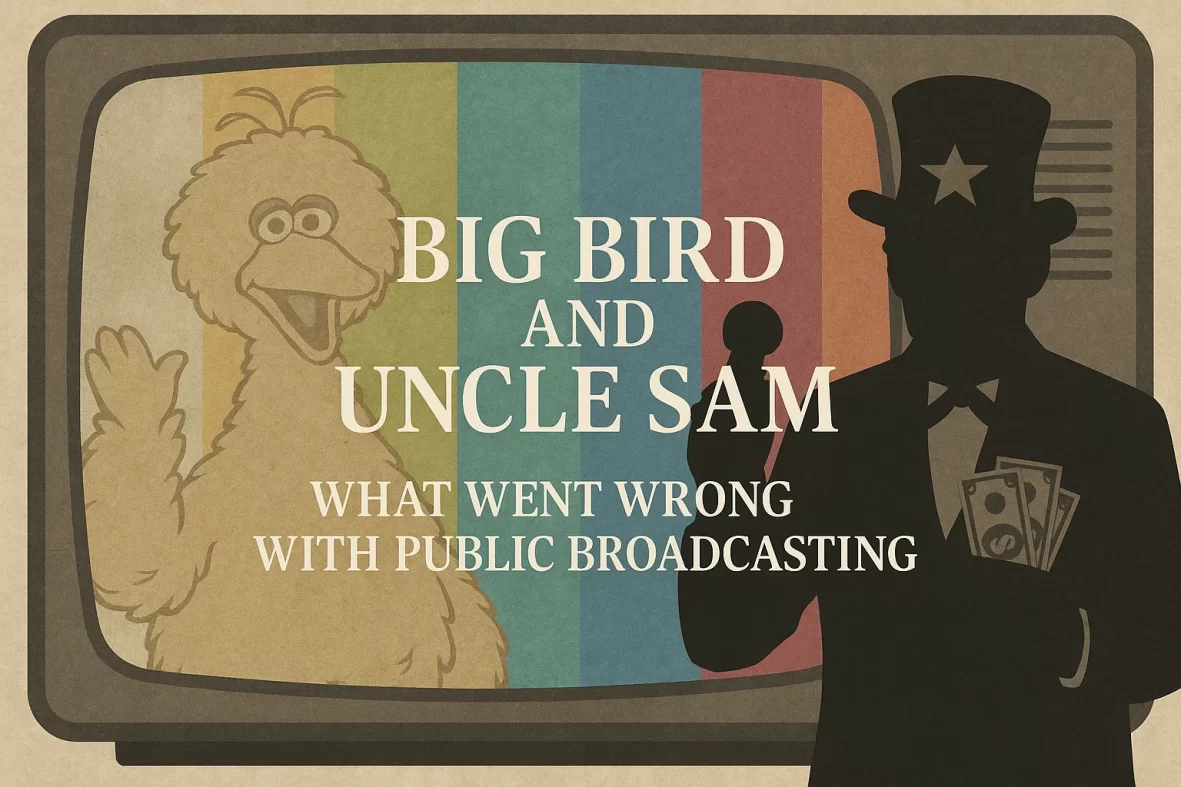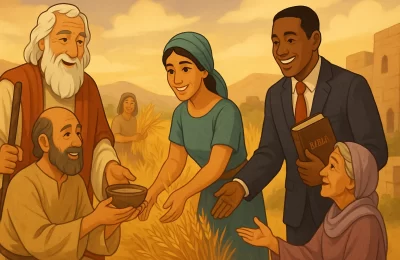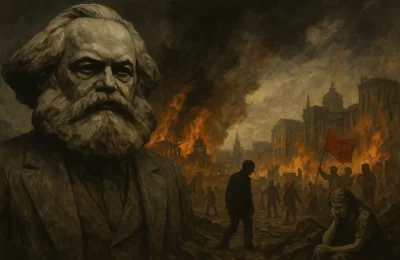Tracing the rise, relevance, and growing controversy of government-funded media—from a constitutional and biblical worldview
Introduction: From Ken Burns to Culture Wars
I still remember watching The Civil War by Ken Burns for the first time—sweeping violin melodies, haunting sepia photos, and Shelby Foote spinning tales like a Southern sage. PBS felt like America’s family room: a place where you could learn something real, something reverent.
Back then, “public broadcasting” evoked Shakespeare, Sesame Street, and Nova—not slogans, side-eyes, or social lectures. But something has shifted. And quietly—almost imperceptibly at first—so has the public’s trust.
Today, a growing number of Americans are asking: Why are we still funding NPR and PBS with taxpayer dollars? More pointedly: Why is the federal government in the broadcasting business at all?
While PBS and NPR have offered cultural value, the federal government never had constitutional authority to fund media—and recent trends in ideological drift only deepen the need to reconsider that funding. So how did Big Bird end up on Uncle Sam’s payroll—and what are the consequences when the government becomes a cultural storyteller? Let’s trace the history, follow the money, and explore what Scripture and the Constitution have to say.
The Invention of “Public” Media
In 1967, amid a national swirl of war protests, moon missions, and Beatlemania, President Lyndon B. Johnson signed the Public Broadcasting Act, establishing the Corporation for Public Broadcasting (CPB). This nonprofit was designed to channel federal funds to support public television and radio—free from commercial pressure, and (allegedly) free from political interference.
Two new branches quickly grew:
- PBS (1970): A system of non-commercial television stations focused on education and culture.
- NPR (1970): A nonprofit radio network created to bring long-form journalism, classical music, and cultural storytelling to national radio.
The idea wasn’t sinister. It was civic. At least on paper.
In a pre-Internet age, broadcasting space was limited, expensive, and dominated by the Big Three networks. “Public broadcasting” promised to give voice to the people. Not government propaganda. Not pop culture. Something higher, nobler—even beautiful.
And in many ways, it delivered.
Credit Where Credit Is Due
Let’s be honest: PBS and NPR have done some good work.
- Ken Burns’ documentaries gave us sweeping masterclasses in American history.
- PBS Kids continues to teach phonics and friendship better than some school districts.
- NPR’s “All Things Considered” once modeled how to hold thoughtful, civil conversations.
- Local stations have partnered with universities and public schools to bring real education into homes that couldn’t afford cable.
These weren’t just entertainment—they were efforts at cultural enrichment.
But cultural value is not the same thing as constitutional authority. It’s possible to appreciate the fruit while questioning the root.
The Constitutional Fault Line
Here’s the blunt truth: The U.S. Constitution doesn’t authorize any of this.
- Article I, Section 8—the list of Congress’s powers—is silent on media.
- There is no “broadcasting clause,” no license to fund newsrooms or underwrite Big Bird.
- Founders like James Madison and Thomas Jefferson were clear: the federal government was to have “few and defined” powers.
If it’s not explicitly given, it’s implicitly forbidden.
Even well-meaning public projects cross the line when funded by compulsory taxation. Taxpayers become unintentional donors to ideological programming—often without their knowledge or consent.
And in recent decades, that consent has been strained.
Mission Drift and Cultural Drift
Once upon a time, NPR and PBS were heralds of civility. Today, they’re increasingly viewed as gatekeepers of progressive orthodoxy.
- NPR’s reporting now routinely adopts the language of critical theory—“lived experience,” “structural oppression,” “gender-affirming care”—without critique.
- PBS has aired children’s programming featuring drag queens, LGBT pride songs, and transgender identity—content many families feel has crossed into ideological formation.
- Editorial framing often portrays biblical morality as controversial, while treating secular progressive values as baseline truth.
To be fair, no media outlet is perfectly neutral. But when your funding is public, your content must be accountable.
What we’ve seen instead is a drift—from curiosity to catechesis, from education to editorialism. Public broadcasting no longer reflects the broad public. It reflects a narrow cultural enclave—with taxpayer backing.
As G.K. Chesterton once warned, “When you abolish God, government becomes god.” And in much of public media, that trade has been made.
Show Me the Money
So how does it all work?
- The Corporation for Public Broadcasting receives around $465 million annually from Congress.
- That money is distributed to local public radio and TV stations—roughly 1,500 affiliates.
- NPR and PBS are technically private, but they depend on CPB funding—especially for rural and under-resourced stations.
- In some markets, CPB funds make up 20%–50% of a station’s budget.
This creates a strange reality: the federal government indirectly sustains a media infrastructure with ideological leanings—while claiming neutrality.
It’s a bit like funding a seminary and insisting you don’t endorse any theology.
Attempts to Pull the Plug
Efforts to defund public broadcasting are not new.
- Ronald Reagan questioned it in the 1980s but left funding largely intact.
- Newt Gingrich’s Contract with America (1994) targeted it for elimination—until backlash softened the blow.
- Donald Trump proposed to zero out CPB funding four times. Congress ignored him four times.
Why the hesitation?
Because PBS and NPR still evoke nostalgia. No politician wants the headline: “Congress Kills Mister Rogers.”
But public sentiment is shifting. Trust in legacy media is declining. Younger audiences are going digital. And more Americans—especially those with originalist and biblical convictions—are asking whether Caesar should own the microphone.
A Biblical Case for Defunding
From a biblical worldview, the question isn’t just what works—but what’s right.
Romans 13 gives us the clearest summary of government’s purpose:
“For rulers are not a cause of fear for good behavior, but for evil. … It is a minister of God to you for good.” Romans 13:3–4
Civil authorities are tasked with protecting life, administering justice, and restraining evil—not managing culture or shaping narratives. That role belongs to families, churches, and free people in voluntary society.
A biblical approach to government asks:
- Is this just?
- Is this within the scope of civil authority?
- Does it promote righteousness—or merely rebrand rebellion with state funding?
When taxpayer money props up platforms that undermine biblical morality, the government exceeds its calling. Worse, it becomes a false shepherd—using public trust to teach private ideology.
What Should Replace It?
If CPB vanished tomorrow, would PBS and NPR disappear?
Not likely.
- Many stations already receive significant private donations.
- Universities and local partners could step in to support education-focused content.
- Independent podcasts, YouTube channels, and Christian media networks are thriving without government dollars.
In fact, removing the federal crutch might revitalize public media—forcing it to serve its audience rather than shape it.
Let the market—and the community—decide what is worth preserving.
Conclusion: Time to Cut the Cord—Gently, Gratefully, but Honestly
Let’s end where we began: with gratitude. PBS and NPR gave us stories, history, music, and wonder. They’ve been part of America’s soundtrack.
But appreciation is not authorization. And nostalgia is not a blank check.
It’s time to say what many have long felt but feared to voice:
Uncle Sam needs to hand the mic back to the people—and Big Bird should find a new sponsor.
Because when the government funds the story, it eventually owns the narrative.
And in a truly free society, the story should never belong to the state.








